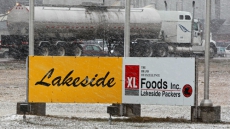TORONTO — Canada's economy added about 6,600 jobs last month, essentially reversing a similar decline in June but having too little effect to change a national unemployment rate that has been stuck at 6.8 per cent for six months in a row.
Statistics Canada's monthly job report provides a fresh reading on an important economic indicator, as well as fuel for an ongoing debate in political and business circles about whether the country fell into a recession in the first half of this year.
Although there seems to be undeniable evidence that the economy shrank in the first quarter and probably the second quarter, the Statistics Canada monthly jobs report released Friday paints a more complicated picture.
The six-month trend "isn't yet pointing to Canada being in recession" because there have been 11,000 jobs added over a period that included a major downturn in the oil and gas sector, said CIBC World Markets economist Nick Exarhos.
"Indeed, the provincial breakdown highlights the narrow hit that the oil shock has had, with Saskatchewan and Alberta reporting employment declines in July, while Quebec posted a healthy gain," Exarhos said in a brief commentary.
Randall Bartlett, a senior economist with the Toronto-Dominion Bank group, said the economy certainly had two quarters of contraction — the basic definition of a recession — and likely remained weak in July.
"While the economy created 7,000 net new jobs in July, all of those were part-time as full-time employment actually fell back in the month," Bartlett said.
There were 17,300 fewer Canadians with full-time jobs in July compared with June, but 23,900 more who had part-time employment, Statistics Canada said. There was also an additional 41,000 people who were self-employed in July.
Regionally, the biggest winner was Quebec — which added 21,700 jobs in total in July, mostly part-time — while the number was flat or lower in all other provinces except Nova Scotia, which added 3,100 positions, mostly full-time. The biggest decline in employment was in Saskatchewan, where 7,400 jobs were lost, most of which were full-time.
Quebec's provincial unemployment rate in July was 7.7 per cent, which was 0.3 percentage points lower than in June but still above a national unemployment rate that has been locked at 6.8 per cent since February.
In Ontario and British Columbia, two of the country's most populous provinces, total employment was little changed in July as decreases in full-time employment were offset by part-time jobs.
But Bartlett said the labour force survey "has missed the mark" lately — pointing to an earlier report that 60,000 jobs were created in May, even though the economy shrank by 0.2 per cent overall in a downturn affecting 13 of 20 major industries.
Bartlett questioned how Ontario could have lost 1,000 jobs in accommodation and food services while it hosted the Pan Am Games from July 10 to 24 and the Canadian dollar was low, often a good thing for tourism.
"That would suggest that there's a bit of a mismatch between what's actually happening here on the ground and what's being portrayed in the labour force survey," he said. "We were expecting a bit more of a bump in Ontario."
In Alberta, the unemployment rate increased by 0.3 percentage points to 6.0 per cent in July — still below the national rate — as more people searched for work. There were 4,300 fewer people employed, as 1,600 additional full-time jobs were offset by 5,900 fewer part-time positions.
In Manitoba, there were 3,800 fewer people working and smaller declines were recorded in three of the four Atlantic provinces, excluding Nova Scotia.

QUICKLIST: CANADIAN UNEMPLOYMENT RATES BY PROVINCE FOR MONTH OF JULY
OTTAWA — Canada's national unemployment rate was 6.8 per cent in July. Here's what happened provincially (previous month in brackets):
— Newfoundland and Labrador 11.9 (12.3)
— Prince Edward Island 11.6 (11.1)
— Nova Scotia 8.1 (8.0)
— New Brunswick 11.0 (10.8)
— Quebec 7.7 (8.0)
— Ontario 6.4 (6.5)
— Manitoba 5.6 (5.3)
— Saskatchewan 5.2 (4.7)
— Alberta 6.0 (5.7)
— British Columbia 6.0 (5.8)




